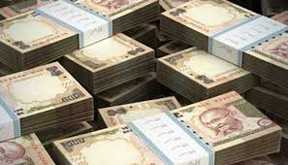 NEW DELHI: All deposits made in an undisclosed overseas bank account since opening will be clubbed while assets like immovable property, shares and jewellery will be valued at fair market price for levy of tax and penalty under the new black money law.
NEW DELHI: All deposits made in an undisclosed overseas bank account since opening will be clubbed while assets like immovable property, shares and jewellery will be valued at fair market price for levy of tax and penalty under the new black money law.
All overseas income and assets, including the ones voluntarily declared within the 90-day compliance window ending September 30, will be valued in rupee terms, Central Board of Direct Taxes (CBDT) said while announcing rules for the new law that has come into force with effect from July 1.
“Value of an account with a bank shall be the sum of all the deposits made in the account with the bank since the date of opening of the account,” the rules said.
As per the rules notified today, the fair market value of assets like bullion, jewellery or precious stone, immovable property, drawings, paintings, archaeological collections, and sculptures or work of art, will be “its cost of acquisition” or the price that the asset “shall ordinarily fetch if sold in the open market on the valuation date”, whichever is higher.
The Black Money (Undisclosed Foreign Income and Assets) and Imposition of Tax Act, 2015, provides for a tax and penalty of 60 per cent if the foreign assets are disclosed within the compliance window and tax is paid by December 31.
After the expiry of window, such persons have to pay tax and penalty of 120 per cent on the undisclosed income or assets held abroad.
A statement issued by the Finance Ministry said that the Commissioner of Income Tax will inform the declarant within October 10 whether the competent authority has any prior information with regard to the assets declared.
“The declarant may revise his declaration within 15 days of receipt of the intimation from the Commissioner of Income Tax,” it added.
As per the rules, for shares and securities, the fair market value will be the higher of the cost of acquisition or average of the lowest and highest price on the date of valuation. . Along with the rules, the CBDT has appended seven forms including those which have to be filled by persons while declaring the overseas undisclosed assets.
The holders of the assets will have to disclose details of the assets with regard to its location, fair market value and date of acquisition.
With regard to jewellery, the rules said disclosures have to be made about the purity, quantum and value of gold, diamond and other precious metals.
Further, the Reserve Bank’s reference rate on the date of valuation should be used for converting the value of foreign assets and income into Indian rupee.
Where the fair market value of an asset is determined in a currency other than one of the permitted currencies designated by RBI, they should be converted into US dollars on the date of valuation as per the rate specified by the central bank of that country. Thereafter, the value in dollar would be converted into rupee.
The rules also provide for the format of notices to be sent to the persons holding undisclosed assets. Also the format for appeals to Commissioner (Appeals) and Appellate Tribunal have been provided.
The rules also provided a formula for calculating the fair market value of an unquoted equity shares and provided a methodology for calculating the interest of a person in a partnership firm, association of persons or Limited Liability Partnership (LLP).
The rules also said in case the person disclosing foreign income does not have a PAN, he or she would be required to apply for it.
Commenting on the rules, EY India Tax Partner Amarpal Chadha said: “It is important for people to collate information already disclosed under the normal income tax returns and reconcile the same with the disclosures being made now under the black money Act.” –PTI






